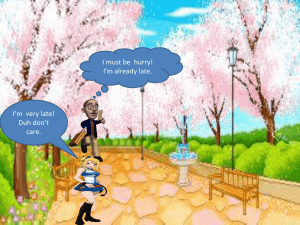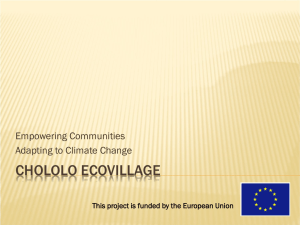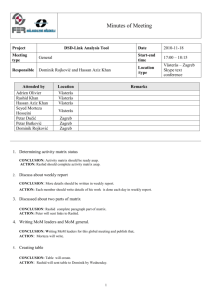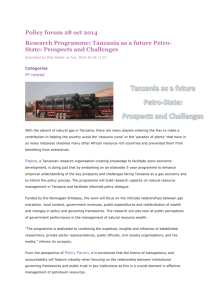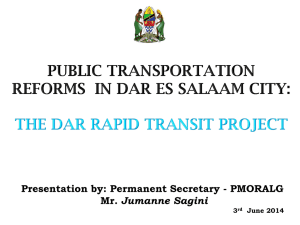CITATIONHERashidMfaumeKawawa
advertisement
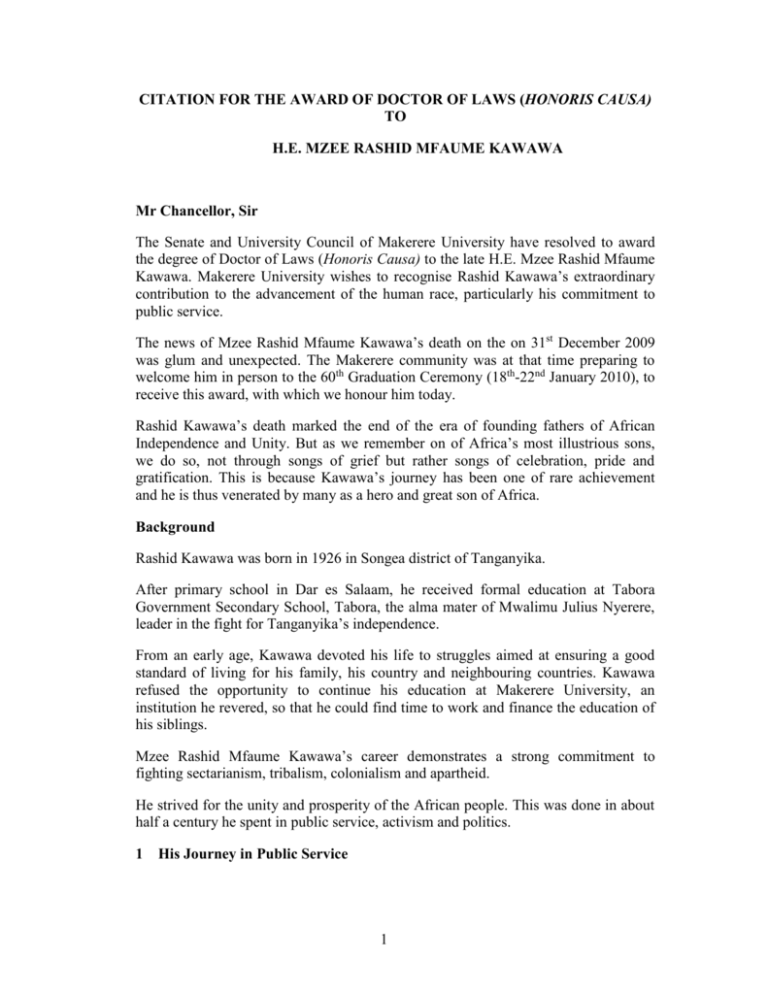
CITATION FOR THE AWARD OF DOCTOR OF LAWS (HONORIS CAUSA) TO H.E. MZEE RASHID MFAUME KAWAWA Mr Chancellor, Sir The Senate and University Council of Makerere University have resolved to award the degree of Doctor of Laws (Honoris Causa) to the late H.E. Mzee Rashid Mfaume Kawawa. Makerere University wishes to recognise Rashid Kawawa’s extraordinary contribution to the advancement of the human race, particularly his commitment to public service. The news of Mzee Rashid Mfaume Kawawa’s death on the on 31st December 2009 was glum and unexpected. The Makerere community was at that time preparing to welcome him in person to the 60th Graduation Ceremony (18th-22nd January 2010), to receive this award, with which we honour him today. Rashid Kawawa’s death marked the end of the era of founding fathers of African Independence and Unity. But as we remember on of Africa’s most illustrious sons, we do so, not through songs of grief but rather songs of celebration, pride and gratification. This is because Kawawa’s journey has been one of rare achievement and he is thus venerated by many as a hero and great son of Africa. Background Rashid Kawawa was born in 1926 in Songea district of Tanganyika. After primary school in Dar es Salaam, he received formal education at Tabora Government Secondary School, Tabora, the alma mater of Mwalimu Julius Nyerere, leader in the fight for Tanganyika’s independence. From an early age, Kawawa devoted his life to struggles aimed at ensuring a good standard of living for his family, his country and neighbouring countries. Kawawa refused the opportunity to continue his education at Makerere University, an institution he revered, so that he could find time to work and finance the education of his siblings. Mzee Rashid Mfaume Kawawa’s career demonstrates a strong commitment to fighting sectarianism, tribalism, colonialism and apartheid. He strived for the unity and prosperity of the African people. This was done in about half a century he spent in public service, activism and politics. 1 His Journey in Public Service 1 Kawawa’s first job was an Accounts Clerk in the Public Works Department (PWD) of Tanganyika. Despite getting the much needed job and money, Kawawa felt his efforts were misplaced. He therefore wished to do something related to Social Work. In 1951, Kawawa realised his long –standing dream of becoming a social worker. In his new job, Kawawa joined a mobile film unit engaged in government literacy programmes. He actually launched this career by organizing a literacy campaign of adults, while a student in Dar es Salaam. When it was decided that the unit be used for educational filming, Rashid Kawawa was chosen as the only Tanzanian lead actor. This presented him with an opportunity to directly offer education to the masses. He also served as a scriptwriter and producer. In 1953, Kawawa was posted to Central Tanganyika as a social worker among the Kikuyu detainees who had been confined because of the Mau Mau movement in Kenya. He successfully struggled for a decent life for the detainees, an experience which he later described the “greatest challenge of his life”. Nevertheless this experience influenced his attitude towards the plight of refugees and in his later political career, he enormously contributed to the welfare of asylum seekers in Tanzania. 2 Kawawa’s struggles for People’s Rights Right from the moment Kawawa started working, he had a deep interest in having a free and united community, a community living in harmony working together for development. He therefore exploited all opportunities availed to him by circumstances, to fight for the rights and freedoms of people around him. Realizing the advantages of a nation-wide organization, Kawawa helped in the founding of the Tanganyika Federation of Labour (TFL). In 1955, he was elected its first General Secretary. With TFL, he could fight for the rights of all workers whether or not in government service. During the struggle for independence in the mid-1950s, Mr. Kawawa was a thereat to exploitative employers and their colonial masters, due to his role as a “no nonsense” trade unionist, a firebrand and fearless advocate for the poor and exploited. It is for this reason, that he won the name “Simba wa Vita,” loosely translated as “the Lion of War”. His war was also aimed at restoring dignity to Africans and conquering the people’s enemies – poverty, ignorance and disease. It was this war that he endlessly fought throughout his life. In February 1956, being a Public Servant, Kawawa was prohibited by law from political participation. All his struggles had to be limited to trade unions. His commitment to use the unions to further independence forced him to resign from 2 public service in order to devote his time and efforts to labour and political organizations. It is no surprise that it has been said that Kawawa was the 1st generation of African leaders who demonstrated to the people the need to live what you believe in. Rashid Kawawa would certainly prescribe to the Ubuntu philosophy of an African world view which calls each of us to declare thus: “I am because you are” meaning that individuals need other people to be fulfilled. In 1957, Radhid Kawawa became a central committee member of the Tanganyika African National Union (TANU). He was also appointed to the Legislative Council. He remained a member of the Legislative Council until 1960. He remained a member of the Council until 1960. With his appointment to Cabinet in 1960, he resigned from TFL and concentrated on politics. 3 Kawawa in Political Service Rashid Kawawa served in several political offices in Tanganyika and later Tanzania for nearly half a century as follows: In 1960, he was appointed the Vice President of TANU Between 22nd Jan 1962 and 9th Dec 1962, Rashid Kawawa was the Prime Minister of Tanganyika On 9th December 1962, Tanganyika became a republic and Rashid Kawawa became the first Vice President of the republic of Tanganyika After 1964, with the formation of Tanzania from Tanganyika and Zanzibar, Kawawa became the second Vice President of Tanzania serving as Nyerere's principal assistant for mainland affairs and as leader of the National Assembly. Between 17th Feb 1972 – 13th Feb 1977, Rashid Kawawa was the Prime Minister of Tanzania until he was succeeded by Edward Sokoine with whom he swapped to become Minister for Defence and National Service. Rashid Kawawa was also a Member of Parliament in the National Assembly of Tanganyika and Tanzania for many years. Rashid Kawawa left government service in 1985. However, he remained a progressive figure in politics. In 1994, he announced his retirement from politics. 4 Major Accomplishments 3 Rashid Kawawa was a leader for TANU and later Chama Cha Mapinduzi (CCM) for many years. These parties enjoyed popular support from Tanzanians who included Africans, Asians and Europeans. They emphasized development of National Unity through eliminating tribalism and promoting interracial co-operation. He believed that the struggle for the liberation of colonized countries was Tanzania’s struggle as well. He thus influenced Tanzanians to the point of considering that their freedom should wait for the independence of other African countries. Kawawa greatly contributed to the anti-colonial movement. The first thing the anticolonial movement did was to show the world that we (Africans) were ready for independence. The movement also sent a message to the colonial masters that Africans could join hands and fight against colonial rule. H.E Kawawa participated in opening up the African continent to the whole world, sending a message that there were no more hindrances that could stop any country doing business with Africans. During his reign as Prime Minister and Vice President he tried as much as possible to uphold the Press Freedom Refugees While Vice-President and Prime Minister, H.E Kawawa championed refugee settlement in Tanzania. Since its independence, Tanzania has been the location of choice for many refugees, politicians inclusive, in the Great lakes region. Tanzania was able to manage mass refugee migrations such as those experienced in 1990s. Vice President Rashid Kawawa articulated the government’s motivation for the Refugee Migration Policy by stating: “Tanzania’s government is convinced that her independence is incomplete before the whole of Africa becomes free. We shall neither give up nor lag behind in supporting the refugees … We cannot help those who run away to seek a luxurious life. We will help those who want to free their countries.’’ Kiswahili As Prime Minister and Vice President, Rashid Kawawa promoted Kiswahili as a medium of communication in Tanzania. This helped to unite the over 120 ethnic groups. Soon after independence as Prime Minister, Rashid Kawawa, declared that Kiswahili would become a national language to be used at state and public functions and was also to be a second language in Parliament along with English. East African Community Throughout his political career, Rashid Kawawa advocated for a United and free Africa. He was one of the promoters and political supporters of the East African Community and East African Institutions like Makerere University (University of East Africa); East African Development Bank; Inter-University Council of East 4 Africa among others. Some of these institutions remained functional even when the East African community was politically non-existent Even in retirement, Rashid Kawawa continued to advocate for economic and political integration of East Africa. Idi Amin Rashid Kawawa played a crucial in the liberation of Uganda from the Idi-Amin regime in 1979. Ujamaa As Prime Minister he participated in the shaping of the rural development policy of Tanzania based on Ujamaa village models. Rashid Kawawa spearheaded the implementation of The Arusha Declaration that called for self reliance through the creation of co-operative farm villages and the nationalization of factories, plantations, banks, and private companies. Sports Rashid Kawawa had enthusiasm for sports. On 30th May 2009, he was presented with the special recognition award by Prime Minister of Tanzania. Kawawa was well known to be fond of football, notably as both as a player and referee. At different occasions, he was consulted to solve conflicts mostly for the mainland clubs. During his hey days, the former Premier is said to have at different times, played for the Members of the Parliament team as their captain and also as the match official. He was once an actor. Rashid Kawawa was no doubt a multi-skilled personality, a characteristic which enriches a leader. 5. Awards Among other awards of repute, Rashid Kawawa was recognised by the University of Massachusetts Dartmouth in 2007 as a great fighter for equality, freedom and justice in Africa. He was awarded the Drum Major Award to memorialize the legacy of Dr. Martin Luther King Jr. – known by all and sundry as a great African-American fighter for equality and justice in the United States. 6. Conclusion May I conclude by stating that, Throughout his life, Mzee Rashid Mfaume Kawawa distinguished himself as a selfless and hardworking person who invested all his efforts in fighting for the freedoms of peoples in his country, region and Africa. For this, Makerere honours him. Because he spearheaded development, unity, hard work and freedom. Because he disassociated himself from and fought secretarianism, tribalism, colonialism and apartheid. Because he was a truly honest and hardworking statesman. 5 Because He was a role model for many progressive persons and continued giving his wise counsel right up to his last weeks-: We in Makerere University would like to honor him. For being one of the towering stalwarts of Pan-Africanism which led to the independence of Africa – A patriot who served Africa tirelessly, with much dedication and devotion – An exemplary leader who always kept National and Regional interest above the personal He was one of the last leaders in a generation of leaders whose main quality was characterized by uprightness, moral credibility and integrity. Today, several generations may not be able to fully appreciate the courage and sacrifices made by the leaders who started the fight for our independence against tremendous odds, risks and personal sacrifices. It is thus imperative that we are continuously reminded that the struggle for independence from colonial rule needed a leadership of courage, dedication and sacrifice – attributes which Rashid Kawawa was richly endowed and used for the good of humanity. In recognition, therefore, of his outstanding contribution to humanity, I have the pleasure to invite you, Mr Chancellor, to confer, posthumously, the Degree of Doctor of Laws (Honoris Causa), on H.E Rashid Mfaume Kawawa. Orator: Professor Lillian Tibatemwa-Ekirikubinza (Ph.D) First Deputy Vice-Chancellor (Academic Affairs) Makerere University December 12, 2010 6
